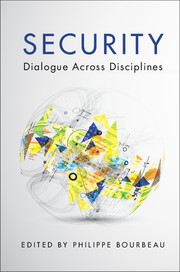Book contents
- Frontmatter
- Contents
- Notes on contributors
- Acknowledgments
- 1 A multidisciplinary dialogue on security
- 2 Philosophy: The concepts of security, fear, liberty, and the state
- 3 Anthropology/ies: Moving beyond disciplinary approaches to security
- 4 Geography: Securing places and spaces of securitization
- 5 Sociology: Security and insecurities
- 6 International relations: Celebrating eclectic dynamism in security studies
- 7 Psychology: The phenomenology of human security
- 8 International political economy: Conceptual affinities and substantive differences with security studies
- 9 Criminology: Reimagining Security
- 10 International law: Between legalism and securitization
- References
- Index
5 - Sociology: Security and insecurities
Published online by Cambridge University Press: 05 December 2015
- Frontmatter
- Contents
- Notes on contributors
- Acknowledgments
- 1 A multidisciplinary dialogue on security
- 2 Philosophy: The concepts of security, fear, liberty, and the state
- 3 Anthropology/ies: Moving beyond disciplinary approaches to security
- 4 Geography: Securing places and spaces of securitization
- 5 Sociology: Security and insecurities
- 6 International relations: Celebrating eclectic dynamism in security studies
- 7 Psychology: The phenomenology of human security
- 8 International political economy: Conceptual affinities and substantive differences with security studies
- 9 Criminology: Reimagining Security
- 10 International law: Between legalism and securitization
- References
- Index
Summary
In contrast to other disciplines, “security” has not traditionally been a central focus of sociological research. This is not to say that sociologists have not studied problems, sites, interactions, and discourses that are relevant to what has elsewhere been classified as security. But they have tended not to conceptualize their work as such. Over the last fifteen years, however, this inattention to security has begun to shift, and sociologists have increasingly begun to frame their work around the concept. This has included those who study the terrains of security as it is understood in other disciplines – the realms of states, warfare, and political violence. But it has also included sociologists at the core of the discipline who research its traditional concerns of economic inequality, the family, and other social institutions.
The study of security within sociology is thus bifurcated, with a small but robust tradition studying what we will call here political security in dialogue with other disciplines. Following Hobbes, scholars of political science and international relations focus on security as the key service provided by the state, most often referring to interstate war and subwar conflicts. Sociologists have engaged little with the concept of human security that emerged after the 1994 United Nations Human Development Report (e.g., Gasper 2005). Security-related research by sociologists has often focused on the production of expert knowledge and collective cultural interpretations of these problems, as well as about security and danger more generally, especially in regard to revolution, terrorism, state violence against domestic civilians, fear of crime, and disasters.
The disciplinary core of sociology, however, has more often focused on insecurities of various sorts, particularly social, economic, or interpersonal. This division is a function of the historical division of the “objects of knowledge” among the social sciences by which professional incentives within disciplines are organized around particular objects and levels of analysis. Sociologists tend to study processes within particular societies, leaving the study of other countries to anthropology and transnational politics to political science. Furthermore, “security” is not a category in which sociology departments generally hire, although they do hire scholars who study crime, law, deviance, social control, and, more recently, global processes. This means that relatively few sociologists will focus their attention on what we are here calling “political security,” at least until the interdisciplinary study of security makes claims upon the core of the discipline.
- Type
- Chapter
- Information
- SecurityDialogue across Disciplines, pp. 90 - 110Publisher: Cambridge University PressPrint publication year: 2015
- 1
- Cited by

